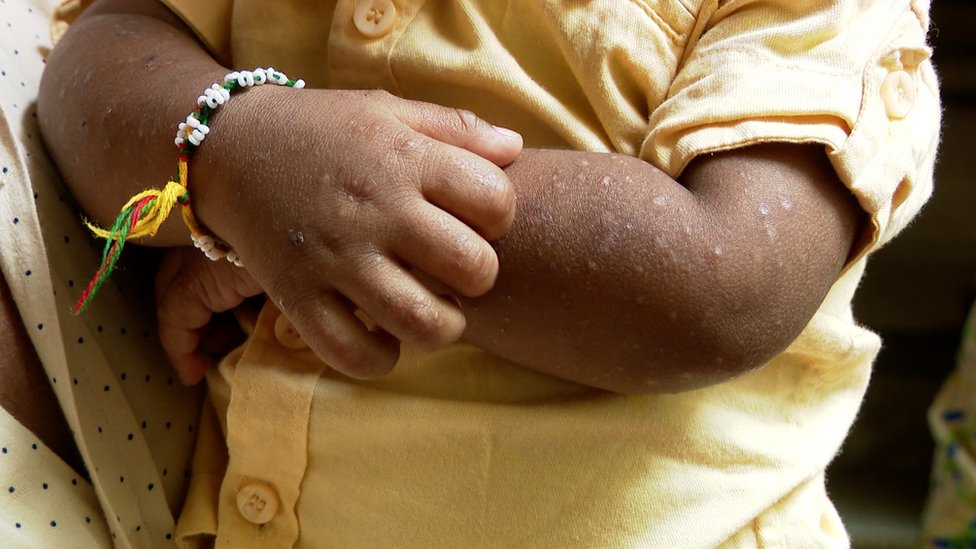
Image caption
Piles of garbage are a common sight in Mahul
Tens of thousands of people are fighting to leave Mahul, a heavily industrialised neighbourhood in the western Indian city of Mumbai, saying the toxic pollution there is adversely impacting their health.
TheIndianSubcontinent Marathi's Mayuresh Konnur and Janhavee Moole report on the residents' battle to be relocated.
Anita Dhole, 38, was forced to move to a "transit camp" set up by the civic authorities in Mahul in May 2017 after the illegal slum she was living in was demolished.
Since then, she says, she has been suffering.
"I have breathing trouble and high blood pressure, and the pollution has also affected my eyesight," she says.Hers was one of more than 5,000 families - estimated to be between 30,000 and 50,000 people - that lost their homes in the demolition drive and were offered temporary housing in Mahul.
They were told they would be given homes in another Mumbai suburb later but, residents say, Mahul is not fit for living, even for a short time.
Image caption
Ms Dhole has been living here since May 2017
A former fishing village, it's now close to oil and petroleum refineries, chemical factories and fertiliser plants.
A report in 2013 by the King Edward Memorial Hospital said that around 67% of people living in Mahul complained of breathlessness several times a month and around 84% of them complained of eye-irritation.
In 2015, India's environment court National Green Tribunal said there was "a perceptible threat to [the] health of residents" in Mahul because of the "prevailing air quality in the area".But local municipal authorities say three different surveys by the Maharashtra Pollution Control Board show "that the pollution levels in Mahul are not different from other areas of Mumbai".Yet residents blame breathing issues, asthma, skin diseases, tuberculosis and blood pressure-related problems on poor local conditions.Ms Dhole says her parents fell so sick in Mahul that they soon left for their village.
Image caption
Skin infections are common among residents
Shamdas Salve, who also moved to Mahul last year, says his two-year-old son has had a persistent skin infection for the past five months.
"He doesn't sleep the whole night and keeps scratching.
I've consulted several skin specialists and changed his medication but he has had no relief.
He cries and keeps scratching.
He now has marks on his face too."His words are echoed by many of his neighbours - 10-year-old Sahil suffers from TB and so does 17-month-old Anshul Tusambad; Maya Goswami, 55, struggles with asthma; and 18-year-old Kavita Subramanyan has low BP and breathing problems.
Besides pollution, residents say they have no access to clean water and sewage facilities and that electricity supply is far from regular.
There are also no hospitals or schools nearby.
The area is poorly connected with other parts of the city and, as a result, many women have been forced to quit their jobs and stay home.Image caption
Overflowing sewage in Mahul's transit camp
The transit camp where Ms Dhole lives is actually a block of apartments that goes by the official name of Eversmile layout.
It has dozens of buildings and each is home to 300 congested one-room apartments.
The complex is filthy - sewage pipes are broken, gutters are overflowing; electric wires are dangling everywhere; the air is stuffy, mosquitoes abound and rats scurry past us as we walk around the neighbourhood.Most of these low-cost homes are meant for families who have been relocated because of demolition of unauthorised slums.
Every year, tens of thousands migrate from rural India to Mumbai in search of livelihood and most end up living in illegal shanty towns that often encroach on roads or other city infrastructure.
Image copyrightGetty ImagesImage caption
Thousands were relocated to build the Tansa water pipeline
Most of those who were relocated to Mahul, including Ms Dhole, used to live in a slum along the Tansa pipeline - the 160km (99 miles) long water pipeline that runs through Mumbai, carrying water from Lake Tansa.
It's a major source of water for the city.
Just over half of the pipeline is overground and, over the years, unauthorised houses came up alongside it and, in some places, on top of it.In 2006, a petition was filed in the high court in Mumbai asking the court to order the government to relocate those living in the slums to "ensure that the water, which is used by the citizens of Mumbai, is safe, and that these pipelines do not become a target for persons to attack the citizens of Mumbai".
Read more stories about pollution and the environment:In 2009, the court ruled that there must be a 10-metre gap between the pipeline and the nearest home, which meant that thousands of families had to move out.
Their homes were subsequently demolished and they were told to relocate to Mahul.Many initially refused because of the pollution, but were forced to move as the demolitions continued.
Ms Dhole has started an online petition demanding that they be moved out of Mahul.
She and other residents have also petitioned the high court.
In August, the court said the civic authorities could not force people to move to Mahul and that they must find alternative housing for them or pay rent for those families that did move out.Image copyrightGetty ImagesImage caption
Residents have been protesting for months to be moved elsewhere
The protests have intensified in the past two months with many residents of Mahul's transit camp demonstrating at the site where their homes once stood.They have also launched a campaign on social media with the hashtag and Twitter handle MumbaisToxicHell - demanding that they are relocated again, this time to a safer and healthier environment.

 6
6








